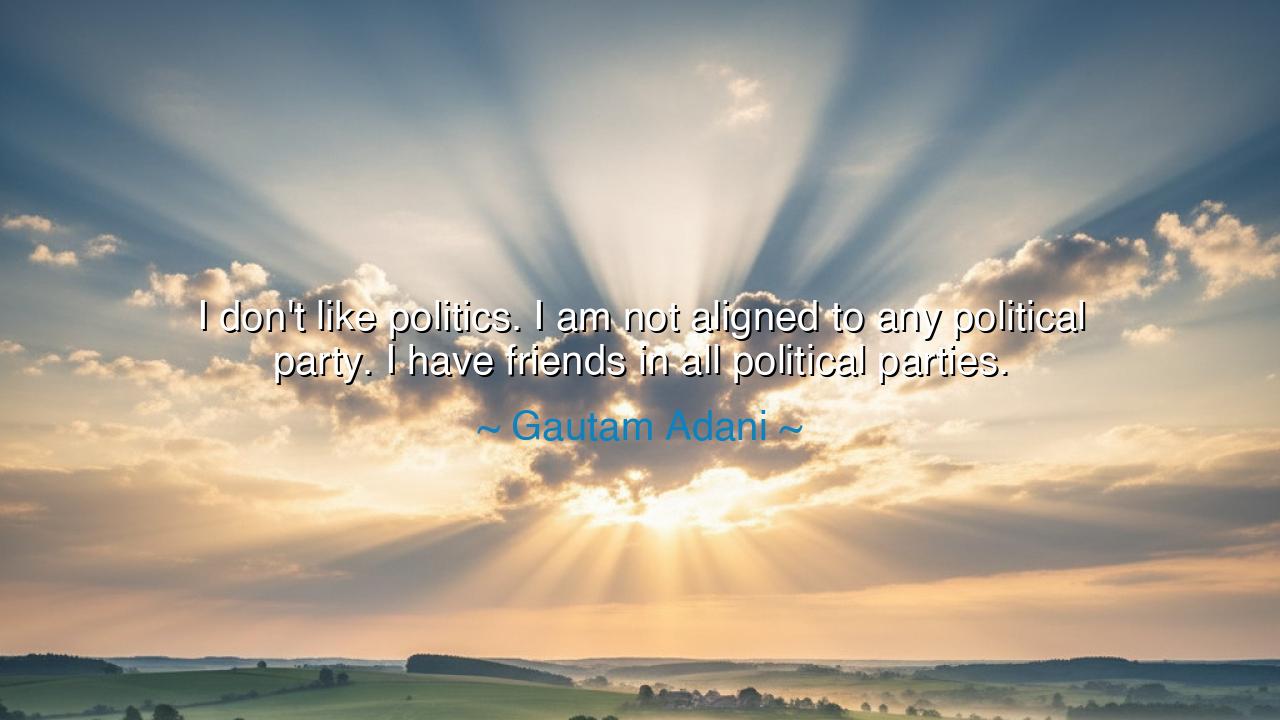
I don't like politics. I am not aligned to any political party.
I don't like politics. I am not aligned to any political party. I have friends in all political parties.






When Gautam Adani declared, “I don’t like politics. I am not aligned to any political party. I have friends in all political parties,” his words echoed an ancient wisdom: that power is not always found in the strife of factions, but in the strength of neutrality. In these words lies a lesson for those who walk the corridors of commerce and leadership—that the storms of politics need not consume the builder, if he anchors himself to a higher purpose. To serve the greater good, one must rise above partisanship, lest the work of lifetimes be undone by the quarrels of the day.
The saying reveals the posture of one who seeks to shape destinies not with rhetoric, but with enterprise. To be unbound by political party is to stand like a mountain, unmoved by the passing winds of ideology. Yet it is not withdrawal; rather, it is wisdom. The man who can hold friends in all political parties chooses not the sword of division, but the bridge of fellowship. Such a stance recalls the sages who counseled kings, warning them not to bind their fortunes to a single camp, for power shifts like sand, and those who tether themselves too tightly risk ruin when the tide turns.
History, too, bears witness to this truth. In ancient India, the merchant guilds of cities like Ujjain and Taxila flourished because they dealt with all rulers impartially, lending their craft and wealth to society while avoiding entanglement in dynastic rivalries. And in more recent times, great industrialists who courted one party too eagerly often found themselves broken when power changed hands. But those who walked the middle path, like pillars between rival forces, endured, and their enterprises outlived kings and ministers alike.
There is also humility in Adani’s statement. To confess, “I don’t like politics,” is to acknowledge that the realm of governance, with its intrigues and ambitions, is not the true calling of every soul. Some are born to trade, to build, to transform resources into abundance for the many. By rejecting partisanship, yet embracing friendship across divides, he chooses a nobler battlefield: not that of legislatures, but of creation and progress.
Thus, the lesson for the generations to come is clear. Beware the lure of factions and the hatred they breed. Stand instead in the middle ground, where friendships cross borders, and where one’s legacy is not the echo of slogans, but the enduring fruits of labor. For those who seek greatness beyond the age, neutrality in politics is not weakness—it is strength, it is balance, and it is the wisdom that outlasts empires.






Pptnb
Adani’s indifference toward political affiliation seems refreshing on one hand, but also raises questions. In a world where political choices deeply influence the direction of economies and communities, how can someone with such power remain unaligned? Does this approach allow him to be more pragmatic, or does it signal a lack of investment in the political decisions that shape the world around him? Can neutrality ever be a position of true leadership?
PANguyen Phong Anh
Adani’s statement about politics makes me think about the difficulty of being neutral in a world that’s so politically charged. How can you separate personal relationships from political ideologies? Is it possible to truly be friends with people from different political backgrounds without compromising your own beliefs or values? Does neutrality offer more freedom, or does it avoid engaging with important societal issues that need attention?
TTnguyen thu trang
I can understand Adani’s sentiment about not being aligned with any political party, but I wonder if this neutrality is truly achievable for someone in his position. Can you stay completely uninvolved in politics when political decisions affect so many aspects of your business and personal life? Or is it simply easier to stay neutral when you don’t have to answer to the same pressures as the average person?
HHiep
Adani’s stance on politics raises some complex questions. Can we really avoid political affiliation in today's world where politics is so ingrained in everything from business to social issues? Does being friends with members of all political parties allow someone to maintain an objective viewpoint, or does it sometimes blur lines between what’s truly best for society versus personal gain? How do we balance neutrality with accountability in positions of influence?
HNbui huu nghia
I find it interesting that Adani isn’t aligned with any political party, especially considering his prominence. Does being uninvolved in politics mean that he’s disconnected from the struggles that ordinary people face? Is it possible to stay out of politics entirely, or does that inadvertently reinforce the status quo? At what point does being neutral become a form of privilege, especially for individuals in positions of power?